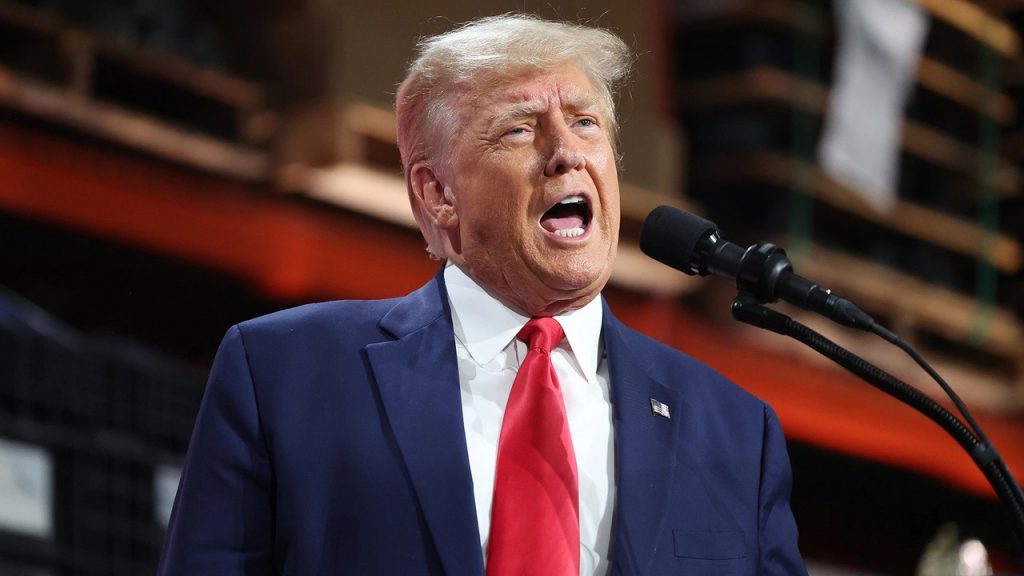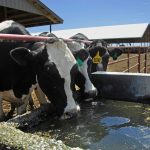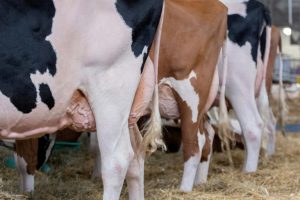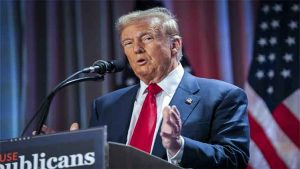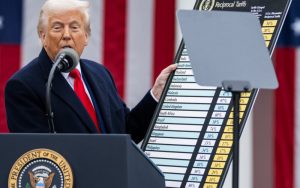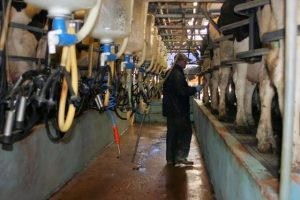
A Rabobank research report predicts inflation, higher deficits and ag trade disruption if the president-elect follows through on economic policy promises.
At a Glance
- Expectation: tax cuts, deregulation, defense spending and tariffs
- Result: higher inflation, slower GDP growth, increased federal deficit
- Grain farmer worries: export markets and higher input and equipment costs
Drop tariffs on the global trade pond during a down cycle in the U.S. agricultural economy and the ripple effects across the country’s financial picture become waves.
That’s the upshot of a report from Rabobank titled Trump 2.0: Impacts on global food and agriculture. The company summarizes the report: “Trump’s return, with a Republican majority, means big changes: tax cuts, deregulation, defense spending, and tariffs. Expect higher inflation, slower GDP growth, and increased deficits, impacting global food and agricultural trade.”
Tariffs are simply the first stone.
When you talk about tariffs, a Rabobank research leader says, “that’s immediately inflationary.”
“That means the goods coming into the country are more expensive,” says Roland Fumasi, head of RaboResearch Food & Agribusiness – North America.
That added expense also hits inputs and equipment for America’s farmers.
“I worry about things like farm input costs going up, as an example, when I think about the producers,” Fumasi says. “Tariffs in isolation: they’re inflationary. Boom.”
Negative economic impacts
Here are a few campaign policy promises with related economic ripples:
Tighter border policy drains labor pool. “That’s inflationary because it decreases our labor pool – overall, not just in agriculture,” Fumasi says. “Fewer people here in the labor pool will tend to be inflationary.”
Tariffs impact interest rates. Inflation boosted by tariffs begets higher interest rates “The interesting other knock-on effect of that is greater inflation will then give the Federal Reserve more incentive to keep interest rates higher for longer to control that inflation,” Fumasi says. “So higher interest rates, that’s not good for our supply chains out there, including food and agriculture.”
Inflation strengthens the U.S. dollar. A strong U.S. dollar restrains exports because it drives up the cost to global buyers with weaker currency.
Tariffs slow Gross Domestic Production. President-elect Trump promises to increase or enact a long list of tariffs on goods from China, Mexico and Canada, the largest trading partners for the U.S. If that happens, the report notes: “Simulations with the National Institute Global Econometric Model indicate that this would lead to a rebound in inflation and a slowdown in real gross domestic product growth because of eroded purchasing power and retaliatory tariffs by trading partners.”
Upsides to proposed policy
Policy initiatives with economic upside include:
Reduced regulation. “Less regulatory burden on the F&A value chain tends to be a positive thing from an economic perspective,” Fumasi says.
Less taxes. While the comprehensive impact on the U.S. economy remains to be seen, he sees the net impact on lower taxes for individuals and businesses is positive. The tax law Mr. Trump initiated during his first term is set to expire in 2025. “Trump will – no doubt – make sure that doesn’t happen,” Fumasi says. “I think that the lower tax burden, or at least keeping the tax burden low for businesses, is a direct positive impact on all businesses, including food and agriculture.”
Lower energy prices. Maybe. “If he lowers some of the regulatory burden on fossil fuel production, for example, that will drive down costs somewhat,” Fumasi says. “I think it’s going to be a challenge for the new administration to significantly increase oil production and significantly drive down energy costs.”
OPEC, Fumasi notes, is well-skilled at balancing supply and demand.
“Even if Trump says ‘Drill, baby, drill’, he doesn’t have direct control over that,” Fumasi says. “The oil industry is as good as anybody in making sure they balance supply and demand to maximize profitability.”
Affordable feed cost. The economic policies in play during the campaign point to downward pressure on grain prices, but that’s a positive for livestock producers. Low grain prices translate to reduced feed cost. “If we do see continued downward pressure on feed and grain prices,” he says, “the positive benefactor is the dairy and the livestock industry.”
Wildcard policy plays
How the incoming U.S. presidential administration plays its policy hand can greatly influence the economic impact of carrying out Mr. Trump’s campaign promises.
Tariff offsets. In his first term, President-elect Trump issued payments to business impacted by the trade war. Market facilitation program payments went to farmers across the county.
-
Positive. For farmers, Fumasi says, payments can make up for the financial losses, largely from retaliatory tariffs.
-
Negative. Such payments, he notes, increase federal budget deficits.
Reduced taxes. Reduced taxes are net good for those who pay less taxes – for instance, those in jobs that depend on tips, which Mr. Trump says will soon be tax-free. Again, however, Fumasi notes the reducing tax bills for citizens also reduced tax income to the federal government.
“The net impact is going to depend on how it ends up being implemented and what’s implemented,” Fumasi says.
Lower regulatory environment. The unknown here is Robert F. Kennedy Jr., if he’s confirmed as secretary of the Department of Health and Human Services. Kennedy, Fumasi says, “could bring increasing scrutiny in the F&A value chain.”
“There’s some things he wants to change which I think are interesting [and] generally go opposite what Trump generally does,” Fumasi notes.
Export flexibility. Though the U.S. lost ground in some export markets when then-President Trump launched the trade war in 2017, the export market impact is hard to pin down.
“The interesting thing about trade, particularly in food, is that it’s a bit like musical chairs,” Fumasi says. “So, if a country buys less from us, then that country has to buy from somewhere else if it needs it, right? And if that country buys it from somewhere else, then that means it’s leaving a gap open somewhere else.”
The how. Across the board, Fumasi says, the how is going to drive economic impact, particularly on agriculture.
President-elect Trump, he says, “has a tendency to want to support rural America and our food and agriculture system.”
“He sees that as one of the key backbones of the American economy,” Fumasi says.
Ultimately, Fumasi notes, this is less about politics and more about economic realities. It’s simply basic economics. “And basic economics,” he notes, “tends to win.”
“Buckle up for some tremendous uncertainty as we roll through the next two to four years.”
You can now read the most important #news on #eDairyNews #Whatsapp channels!!!
🇺🇸 eDairy News INGLÊS: https://whatsapp.com/channel/0029VaKsjzGDTkJyIN6hcP1K
